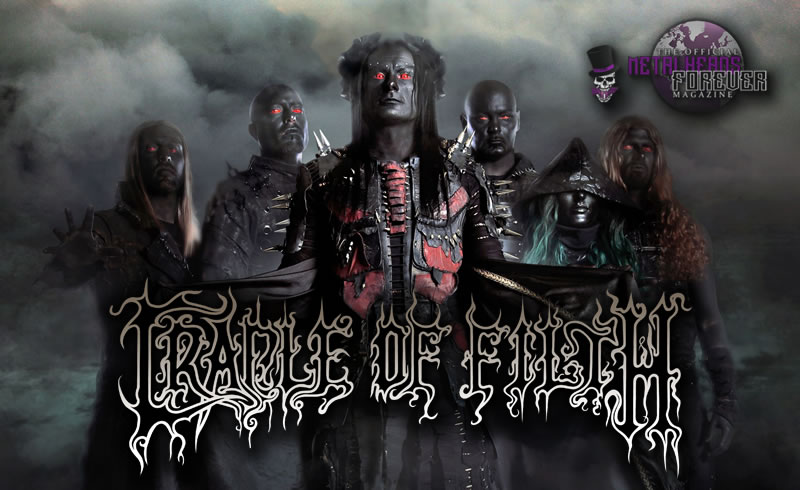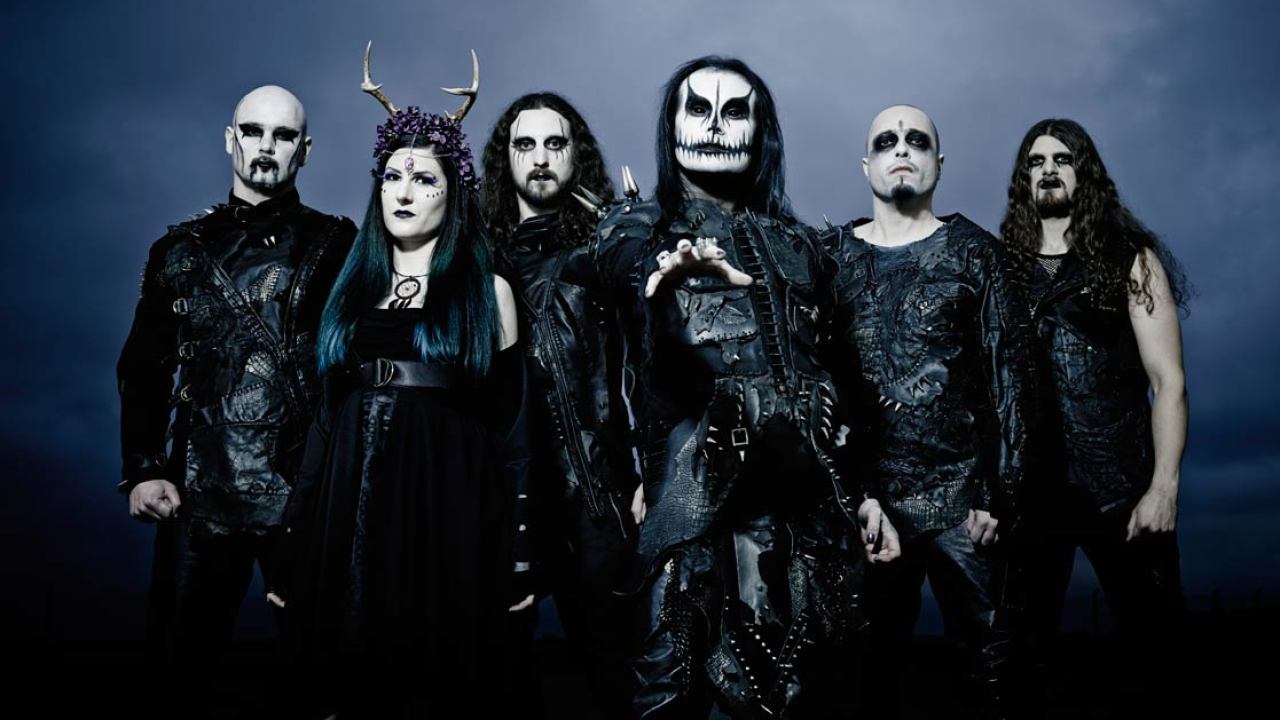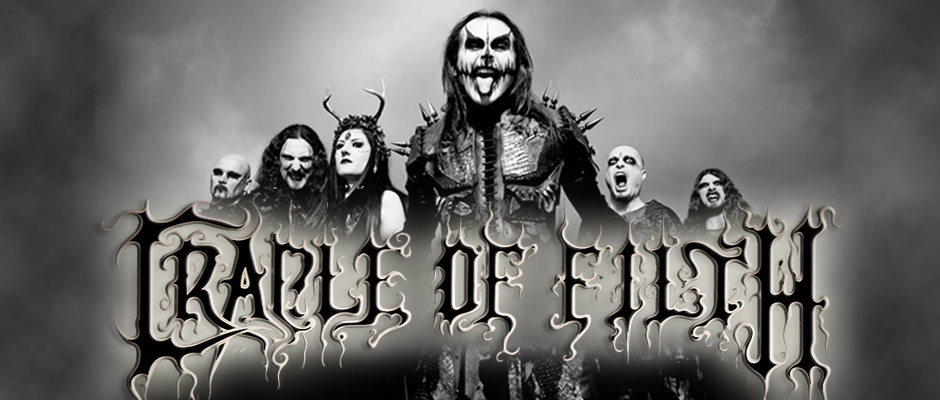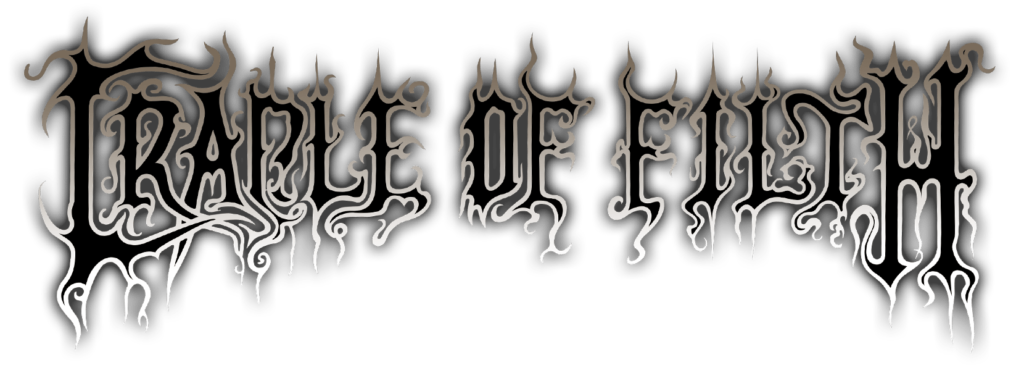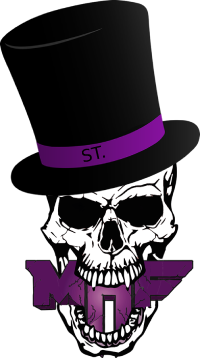“CRADLE OF FILTH” INTERVIEW By Dillon Collins
“In conversation with the Baron of British extreme metal Dani Filth”
They are a band that defy description and he is a frontman who requires no introduction. Dani Filth and his band of cohorts Cradle of Filth have been carving out their mark in blood and bone since 1991, becoming one of the most unique, acclaimed and controversial outfits in British metal along the way. From unsung extreme metal classics Dusk…And Her Embrace and Cruelty and the Beast, to more mainstream recognized epically sweeping gems like Nymphetamine and 2015s Hammer of the Witches, Cradle of Filth have never contented themselves on coasting on the laurels of heydays gone by, or just shocking and awing for the sake of shock and awe. There is purpose and pain, emotive and concentrated, in each note. It is a mindset that has strengthened over time and one that has endeared Cradle of Filth to generations of ravenous listeners. In the wake of their highly anticipated 12th studio album Cryptoriana – The Seductiveness of Decay, Filth caught up with Metalheads Forever Magazine for an in-depth examination into the band’s roots in British heavy metal, their affinity for the Victorian Gothic, and crafting an album that honours filth, past and present.
With your 12th studio album, Cryptoriana – The Seductiveness of Decay, it really feels like Cradle of Filth have really matured and honed in on the absolute best form of their sound. It’s very much a homage to the past while embracing the present from what I can tell.
Dani Filth: Well thank you very much for saying that. I think with the success of Hammer of the Witches we’ve just put one step further forward down the line. The production is great, working with the same producer and studio, and it’s the same lineup of the band. We’re getting along famously as a band. We took some time out to collate our ideas for the album in the Czech Republic where Marthus and Ashok lived last summer. The amount of work that was done in pre-production, we literally had the album ready in that time period, as well as sort of having a mini-holiday. I think the fact that everyone was relaxed also aided the completion of the record. Obviously subject to everyone working on the songs when they got home and polishing that in the studio and the producer will come on board. He’s not going to take everything at face value and he will say I’m not really keen on this or this gets re-working. He pushed everybody as far as we could go with the album and that’s what I really like about him. I’m glad you like it and I think the fans will like it.
What are some things you and your bandmates aimed to do differently when tackling this album?
Dani Filth: There’s a few things we’ve done that are slightly different. There’s no big monumental orchestral parts, mainly just because we wanted something different. The songs are also slightly lengthier. There’s a lot of twin guitar work going on, very New Wave of British Heavy Metal, and that wasn’t intentional. I know it’s a product of the great lineup and their love for various different kinds of music, and being a fan of the band before they joined. Liv Kristine who sang on Nymphetamine lends her vocal talents to the song Vengeful Spirit, a very different song from Nymphetamine, and she characterizes the subject matter. She plays this vengeful spirit in the song. I think we’ve written one of the heaviest songs we’ve ever done in the shape of Death and the Maiden, which is a very epic close to the record. There’s a lot of solos in the record, which is very different, but as people have said it does hark back to Midian and Cruelty and the Beast … It’s Cradle comes full circle. It’s a modern Cradle, but we do have a legacy and a lineage that this album has a passing nod to.
As a Canadian myself, I was quite excited to see the band has taken on a cover for Annihilator’s classic Alison Hell. Take me through your reasoning for covering what is highly regarded as a Canadian metal classic?
Dani Filth: There are two reasons we undertook it. One is we’ve wanted to do a cover for this for absolutely ages, probably before Cruelty and the Beast. I think we undertook it now because it fits very well among the other songs on the album. We haven’t over-Cradelized it and in fact, Jeff Waters has heard it now and said he loved it, said it was very true to form. I wanted it to sound as close to the original as possible. Obviously there are a few eerier bits we’ve added in, but we tried to be as faithful as we could vocal-wise and guitar-wise, even to the level of the bass with the little rundown at the beginning. Yeah, it’s our tribute to him., That’s the second reason as well, because we bumped into him on several occasions over the last couple of years and it’s been mentioned to him we’d be doing the track and he gave us his blessing and said he was very much looking forward to it. That was our reason really for doing that. It’s an intricate song, so it wasn’t like we were running out of material and said let’s do a Green Day cover at the end or something.
Take me through the metal scene in the UK when you and your bandmates were coming up? What would you sight as some of your more predominant influences during that period?
Dani Filth: Strangely enough, where I live in Ipswich in Suffolk of England it was literally, aside for a couple of other places across the country, the capital of the grindcore scene. We’d have these mini-festivals. and one in particular had Napalm Death, Carcass, Bolt Thrower, etc. It was a good time to live. Obviously some of those bands morphed into the origins of British Death Metal. We were also very big fans of the second wave of black metal. I was a big fan of the first wave of black metal, which at the time was more thrash orientated. People didn’t really differentiate entirely between bands like Slayer and Possessed, and then bands like Celtic Frost and Bathory. It’s very interesting that particular epoch in time when the second wave started forming. When it started out all the bands were completely different from one another. You had Moonspell, Necromancia, Immortal, Darkthrone, all of these different bands and each and every one of them sounded completely unique. They were very interesting times. On top of that, massive fans of Paradise Lost, Cathedral, My Dying Bride and that British doom scene … Aside from that grindcore, death and doom metal, we were massive fans of the soundtracks and that turned me onto a lifetime of soundtrack appraisal, that time-frame with Bram Stoker’s Dracula, Interview With the Vampire, Kenneth Branagah’s Mary Shelley’s Frankenstein. All of these films were coming out one after the other with these big flamboyant Gothic melodramas. It was an exciting time and more so because maybe two people had 80s style mobile phones at that point, everything was really mysterious. It wasn’t as immediate as it is now by utilizing social media platforms. You couldn’t find out too much about people. If bands wanted to be incognito, occult, mysterious and underground they could be quite easily. It was all about tape trading, seeing bands at shows or flying over to various countries or writing letters. It was a magical period.
You’ve always been vocally inspired by the Victorian Gothic period, and no more is that true than with Cryptoriana – The Seductiveness of Decay.
Dani Filth: That’s the whole thing about calling the album Cryptoriana – The Seductiveness of Decay, it’s highlighting the Victorian obsession with spirituality, palmistry and communicating with the dead, which they believed was a science. The whole Victorian era seemed draped in this melancholic pall almost, because of their infatuation with these things and Penny Dreadfuls and the classic Gothic authors of that particular time, Oscar Wilde, H.G. Wells and even something like Jack the Ripper, Sweeney Todd, Jekyll & Hyde. It’s very evocative and that carries through with those great authors from that era right through today. That’s why films are still being remade of particular books like Dracula and Frankenstein. The new album is themed and hilted in the Victorian era – songs written in the style of these Victorian authors or actually about Victoriana.
Cradle of Filth have always been tireless live performers. I’d imagine there will be quite the lengthy tour schedule heading into 2018?
Dani Filth: Yes entirely. We’ll be undertaking the most prolific tour that we’ve done for a long while. We’re under new management – our previous manager had worked with us for 20 years and she retired, and with new management came a reboot and nothing could really happen until a new album is ready. Nuclear Blast have gotten really behind it. This year we’re doing Loud Park in Japan and a British tour, but after Christmas the world tour properly begins in January.
For the uninitiated or those wondering the onus or what exactly is Cradle of Filth, what would be something you’d say to them?
Dani Filth: Piss off (laughs). How come you don’t know already, what a silly question! I don’t know. I’ve always said I’d just like to be known as Cradle of Filth and people already know the name and they have their own opinion about what they should call us, how to define us and how to describe the band. I find it very hard because whatever I say would be wrong anyway. Someone will say ‘no you’re totally not symphonic dark vampiric black metal reggae.’ Terminology like that is just reserved for racking CDs in shops and that doesn’t happen that often now anyways. You do get so many silly sub genres now like shoe gazing, black gaze. It would just be nice if the epitaph of band read Cradle of Filth and people knew exactly what that meant.
Cryptoriana – The Seductiveness of Decay is available through Nuclear Blast Records on September 22nd worldwide. Visit cradleoffilth.com to pre-order and for more information.
Dillon Collins/MHF Magazine

